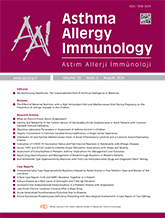


Objective: Studies examining COVID-19 vaccine reactions and reasons for parental hesitancy to COVID-19 vaccines in allergic adolescents are few. This study aimed to identify post-vaccine reactions and parental vaccine refusal/hesitancy among adolescents with allergic diseases.
Materials and Methods: Between January 2022 and April 2022, a questionnaire was completed by the parents of adolescents who were followed at the Pediatric Allergy outpatient clinic. Vaccination status, characteristics of reactions after vaccination, and the frequency of parental vaccine hesitancy were recorded.
Results: Among 104 patients, 70 were followed for asthma, 64 for allergic rhinitis, 12 for drug allergy, 3 for food allergy, and 1 for chronic urticaria. 63.5% (n=66) of the patients were vaccinated. The rate of vaccination was 52.5% in those with a history of COVID-19 and 70% in those without a history of COVID-19 infection (p=0.07). Eight patients were not vaccinated due to recent COVID-19 infection. Reasons for parental vaccine hesitancy/rejection (n=30) included thinking that the vaccine is harmful (63.3%), not effective (53.4%), or not suitable for children (46.7%). 14 (21.2%) children experienced symptoms within the first 2 hours after vaccination. The most common symptom (n=10) was arm pain. Urticaria and itching were reported in one patient and respiratory symptoms were reported in another patient. Both patients could receive the second dose without any reaction.
Conclusion: Vaccination was more frequent among children without a history of COVID-19 infection. One third of the patients were not vaccinated, and the most common reason for vaccine hesitancy was concern about the adverse effects of the vaccine on human health in the long term and distrust of the vaccine. However, vaccinated allergic children did not experience any serious events.